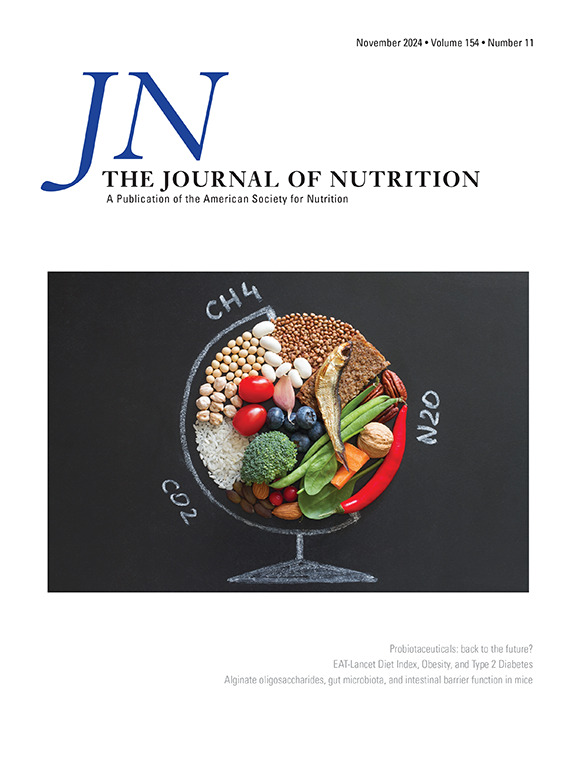Low Protein Diet Exacerbates Experimental Mouse Models of Colitis through Epithelial Autonomous and Nonautonomous Mechanisms
IF 3.7
3区 医学
Q2 NUTRITION & DIETETICS
引用次数: 0
Abstract
Background
Patients with inflammatory bowel diseases (IBDs) are at risk of protein malnutrition due to increased protein loss or reduced dietary intake. The consequences of protein malnutrition on intestinal epithelial metabolism and disease progression remain poorly understood.
Objectives
Given the critical role of the mechanistic target of rapamycin complex 1 (mTORC1) as an amino acid sensor and a key regulator of intestinal epithelial metabolism and homeostasis, along with the well-established influence of diet on the gut microbiota and IBD, we focused on accessing the role of dietary protein in modulating intestinal epithelial mTORC1, determine the contributions of specific amino acids such as leucine and arginine, and examine the interplay between protein malnutrition and gut microbiota driving IBD.
Methods
C57BL/6 mice were assigned to a control (20% protein, n = 6), a low protein (4% protein, n = 7), or diets selectively deficient in leucine, arginine, and other essential amino acids (n = 5–6). Colitis was induced by administering 2.5% dextran sulfate sodium in drinking water for 6 d. Intestinal epithelial mTORC1 activity was assessed by immunoblotting. Gut microbiota composition was characterized using 16S sequencing, and the microbiota’s role in colitis was evaluated through broad-spectrum antibiotic treatment. Disease severity was quantified by monitoring weight loss, colon shortening, histopathological damage, and inflammatory cytokine expression.
Results
Protein restriction increased the severity of dextran sulfate sodium-induced colitis compared to the control diet (∗∗∗P < 0.001). Mice fed arginine-restricted diets exhibited increased colitis (∗P < 0.05). Protein restriction induced significant alterations in gut microbiota composition, and antibiotic-mediated microbiota depletion partially ameliorated colitis severity, revealing a microbiota-dependent mechanism underlying disease exacerbation.
Conclusions
Our study demonstrates a complex interplay between dietary protein, epithelial mTORC1 signaling, and gut microbiota in modulating IBD pathogenesis and highlights the potential for targeted dietary strategies, including amino acid supplementation, to improve disease management in patients with IBD.
低蛋白饮食通过上皮自主和非自主机制加重实验性小鼠结肠炎模型。
背景:炎症性肠病(IBDs)患者由于蛋白质损失增加或饮食摄入减少而面临蛋白质营养不良的风险。蛋白质营养不良对肠上皮代谢和疾病进展的影响仍然知之甚少。目的:考虑到雷帕霉素复合体1 (mTORC1)作为氨基酸传感器和肠上皮代谢和稳态的关键调节剂的关键作用,以及饮食对肠道微生物群和IBD的既定影响,我们专注于获取膳食蛋白质在调节肠上皮mTORC1中的作用,确定特定氨基酸如亮氨酸和精氨酸的贡献。并研究蛋白质营养不良和肠道微生物群驱动IBD之间的相互作用。方法:将C57BL/6小鼠分为对照组(20%蛋白质,n = 6)、低蛋白质组(4%蛋白质,n = 7)和选择性缺乏亮氨酸、精氨酸和其他必需氨基酸组(n = 5-6)。在饮用水中给予2.5%葡聚糖硫酸钠诱导结肠炎6 d。通过免疫印迹法评估肠上皮mTORC1活性。利用16S测序对肠道微生物群组成进行了表征,并通过广谱抗生素治疗评估了微生物群在结肠炎中的作用。通过监测体重减轻、结肠缩短、组织病理学损伤和炎症细胞因子表达来量化疾病严重程度。结果:与对照组相比,限制蛋白质增加了葡聚糖硫酸钠诱导结肠炎的严重程度(∗∗P < 0.001)。饲喂限制精氨酸饲料的小鼠结肠炎发生率升高(∗P < 0.05)。蛋白质限制引起肠道微生物群组成的显著改变,抗生素介导的微生物群消耗部分改善了结肠炎的严重程度,揭示了疾病恶化的微生物群依赖机制。结论:我们的研究证明了饮食蛋白、上皮mTORC1信号传导和肠道微生物群在调节IBD发病机制中的复杂相互作用,并强调了包括氨基酸补充在内的靶向饮食策略改善IBD患者疾病管理的潜力。
本文章由计算机程序翻译,如有差异,请以英文原文为准。
求助全文
约1分钟内获得全文
求助全文
来源期刊

Journal of Nutrition
医学-营养学
CiteScore
7.60
自引率
4.80%
发文量
260
审稿时长
39 days
期刊介绍:
The Journal of Nutrition (JN/J Nutr) publishes peer-reviewed original research papers covering all aspects of experimental nutrition in humans and other animal species; special articles such as reviews and biographies of prominent nutrition scientists; and issues, opinions, and commentaries on controversial issues in nutrition. Supplements are frequently published to provide extended discussion of topics of special interest.
 求助内容:
求助内容: 应助结果提醒方式:
应助结果提醒方式:


